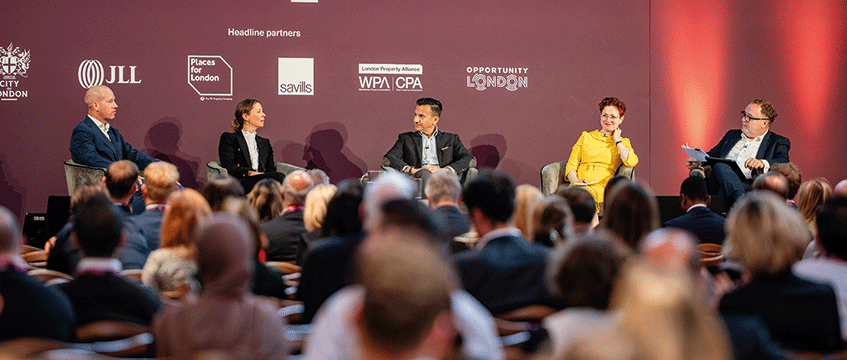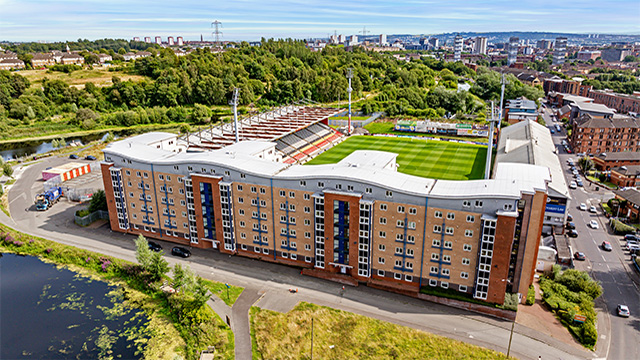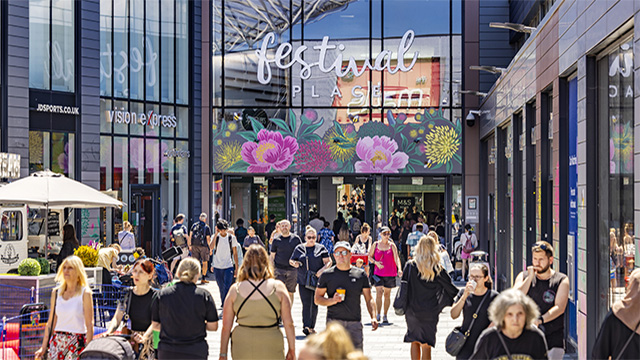London landlords urged to embrace AI and tech transformations
“We are at this transformational moment. Pick the metaphor: the invention of the microscope, finding DNA, sequencing the human genome. We are at this transformational moment where technology is just going to accelerate.”
That was the message from Michael Samuelian, founding director of the Urban Technology Hub at the Jacobs Institute in New York, speaking at last month’s London Real Estate Forum about the prizes up for grabs if cities can seize the moment to nurture the artificial intelligence, science and technology sectors. No pressure, London.
Samuelian was speaking on a Savills-backed panel exploring the role that real estate developers can play in London. Panellists agreed that the upside to be gained is big. But doing so will require shifts in the ways developers and investors think of their roles and how they work with tenants.
“We are at this transformational moment. Pick the metaphor: the invention of the microscope, finding DNA, sequencing the human genome. We are at this transformational moment where technology is just going to accelerate.”
That was the message from Michael Samuelian, founding director of the Urban Technology Hub at the Jacobs Institute in New York, speaking at last month’s London Real Estate Forum about the prizes up for grabs if cities can seize the moment to nurture the artificial intelligence, science and technology sectors. No pressure, London.
Samuelian was speaking on a Savills-backed panel exploring the role that real estate developers can play in London. Panellists agreed that the upside to be gained is big. But doing so will require shifts in the ways developers and investors think of their roles and how they work with tenants.
The starting point is strong. “To foster the synergies, we need to understand London’s foundation, the building blocks of what’s in place for AI, life sciences and sciences in general,” said Steven Lang, research director at Savills. “There are factors of production, factors of success around academia, entrepreneurship, labour, talent and capital. London is incredibly strong on all of these.”
Lang added: “We are a global financial centre here in London. I think it’s really important to embrace AI and become one of the, if not the, leading centres across the globe as well.”
Time to thrive
Laura Citron, chief executive at growth agency London & Partners, said the timing of the conversation was “perfect” given ongoing work on the London Growth Plan.
“One of the really clear emerging priorities of the Growth Plan is frontier innovation,” she said. “We specifically say frontier innovation to distinguish it from other kinds of tech and digital. When we talk about London having a growth opportunity for frontier innovation, we are really talking about the commercialisation of science and R&D. So, yes, it’s life sciences, but it’s also nature science; it’s material science. All of those bases in which we have world-leading research and development, how do we then commercialise them? [It’s about] making sure that we are putting the scaffolding around it in terms of talent and infrastructure and space and place so that it can really thrive.”
At British Land, Amy Hockley, head of innovation leasing, knows that the traditional ways of providing that “scaffolding” will often leave something lacking when it comes to science and tech tenants. That means rethinking the REIT’s approach to space and the ways in which it is sold.
“We know that a lot of these businesses have shorter runways than they would like,” Hockley said. “They are constantly thinking about where their next funding round is coming from, when it might be coming. And so, for them, that typically means shorter-term leases. We are starting to think about fitting out more spaces now because we know that those businesses want to employ their capital in other ways. Why would you go and spend a lot of money fitting out a laboratory that in two years’ time you might have grown out of?”
Hockley added: “How are we making sure we are delivering products that allow them to move through that life cycle at the rate that they want to? At a small scale, that’s thinking about how you build fitted spaces where you can take down a wall and expand into the next unit, so that every 18 months, two years, as they go through their next funding round, they are not going to think, ‘Where are we going to move to next week? Let’s scour London again’. Instead, they will have an environment where they can just scale within.”
Steady hand
That kind of longer-term thinking is crucial if clusters and ecosystems are to grow around real estate schemes.
“I see us as kind of a steady hand, because we are going to be there for 100 years,” said Samuelian. “In many cases, the folks in industry understand that you work on six-month cycles, one-year cycles – depending on where we are in the economy – and our government works on at least four-year cycles. So I see us as a steady hand that helps innovate, but then is also really thoughtful when it comes to technology.”
Tom Mellows, Savills’ head of UK science, believes London landlords have already adapted to the new demands.
“What we have started to see in London is the emergence of specialist landlords that are really keen and committed to this sector for laboratory space and interested about how AI is going to interact,” he said. “I do think the demand from these two groups is going to gravitate towards those specialist landlords over time; the landlords that can provide flexibility, can provide collaboration, can provide incubation, and are really strongly linked into the key stakeholders, [whether] academic or clinical.”
Mellows added: “I think we have come a hell of a long way. We are really going places and I think the future for London is very bright.”
Image © BAR Productions











